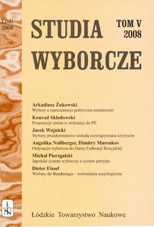Ordynacja do Parlamentu Europejskiego (kilka uwag de lege ferenda)
ELECTORAL LAW TO THE EUROPEAN PARLAMENT: SOME PROPOSALS OF CHANGES
Author(s): Konrad SkładowskiSubject(s): Law, Constitution, Jurisprudence
Published by: Łódzkie Towarzystwo Naukowe
Summary/Abstract: Electoral law to the European Parliament from 23 January 2004 introduced rule of division of seats between constituencies taking part in elections, which have not been yet used in polish electoral law. According to article 127 of Electoral law to the European Parliament, the division of 54 seats is done in two stages. In the first order Public Board of Elections establishes, which of the constituencies exceeded the 5% election threshold, because only the constituencies, which exceeded that threshold can take part in the division of seats. Next, following the d’Hondt method, the number of seats, which certain lists of candidates achieve in the whole country, not only in constituencies, is established. For this purpose, the Public Board of Elections divides the amount of votes in all constituencies, which were given to district lists of certain constituencies, by following absolute numbers until the biggest 56 electoral quotients are achieved. Next, using the Hare-Niemeyra method, the division of seats in constituencies is done between declared district lists of candidates for depiuties. This operation makes it possible to establish, in which constituencies, certain electoral committees will get seats. What are the consequences of accepting this solution? It is worth noticing, that apart from creating 13 constituencies, the division of seats in done in the scale of the whole country, because the electoral law does not indicate what number of seats should apply to particular constituencies. Therefore, as for as their political localization is concerned (meaning: which of the committees/ parties will get them), in those elections the whole territory of the state creates one constituency. The number of seats In constituencies, in the intention of the law creators, was supposed to depend on the electoral attendance in particular constituencies. Research show that the law does not stand up to those intentions, the main factor which influences the division of seats between particular constituencies is their size. Therefore the main argument justifying the use of this system is no longer valid. Due to the obligation to change the electoral law, because of the change in number of deputies to the European Parliament, it is worth to resign from the electoral system, as we know it, sensu stricto.
Journal: Studia Wyborcze
- Issue Year: 2008
- Issue No: 05
- Page Range: 35-42
- Page Count: 18
- Language: Polish

